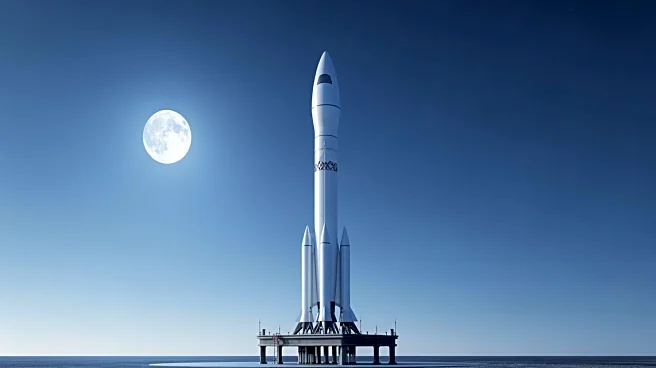What's Happening?
Blue Origin, led by CEO Dave Limp, has expressed its readiness to assist NASA in expediting its lunar mission objectives. Limp emphasized the company's commitment to helping the United States return to the Moon,
stating that Blue Origin is prepared to 'move heaven and Earth' to achieve this goal. The urgency stems from the possibility of China surpassing the U.S. in returning humans to the Moon. NASA's current target for the Artemis III lunar landing mission is set for 2027, but this timeline is considered unrealistic with the existing plans involving SpaceX's Starship and Blue Origin's Mk. 2 lander. In response, NASA has reopened the competition for a human lander, prompting Blue Origin to propose a faster architecture involving multiple versions of its Mk. 1 cargo lander and a modified Mk 1.5 vehicle.
Why It's Important?
The acceleration of NASA's lunar mission is crucial in maintaining the United States' leadership in space exploration, particularly as China poses a competitive threat. The potential for China to land humans on the Moon before the U.S. could shift geopolitical dynamics and influence global space policy. Blue Origin's commitment to speeding up the mission could bolster NASA's efforts and ensure that the U.S. remains at the forefront of lunar exploration. This development also highlights the importance of collaboration between private space companies and government agencies in achieving ambitious space goals.
What's Next?
Blue Origin has already submitted an initial summary of its accelerated lunar mission plan to NASA, with a full report expected soon. The company hopes NASA will consider its proposals seriously, which could lead to adjustments in the timeline and strategy for the Artemis III mission. As NASA evaluates these proposals, the space agency may announce new timelines or partnerships to ensure a timely return to the Moon. Stakeholders, including other space companies and international partners, will be closely monitoring these developments.
Beyond the Headlines
The race to return humans to the Moon is not just a technological challenge but also a strategic one, with implications for international relations and space diplomacy. The collaboration between NASA and private companies like Blue Origin could set precedents for future space missions, influencing how countries and companies work together in space exploration. Additionally, the advancements made in lunar lander technology could have long-term benefits for other space missions, including Mars exploration.











